Section A Grammar Present perfect tense课件 Unit 8 Have you read Treasure Island yet? (人教新目标八下)
文档属性
| 名称 | Section A Grammar Present perfect tense课件 Unit 8 Have you read Treasure Island yet? (人教新目标八下) | 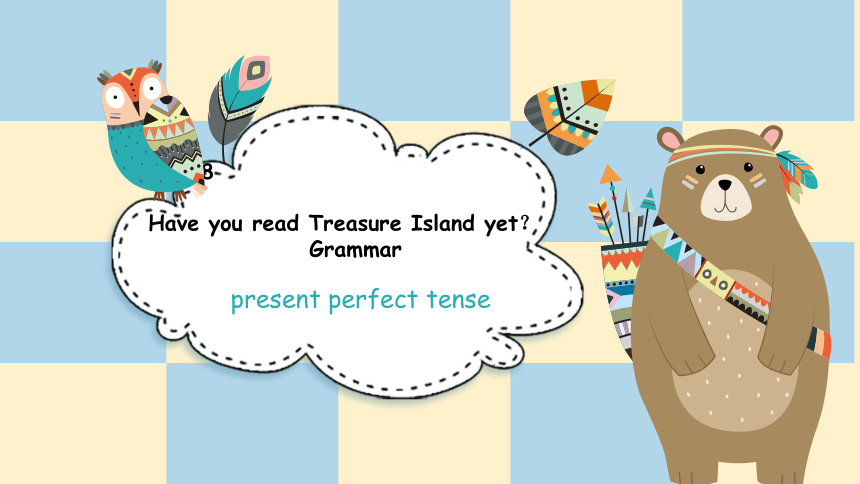 | |
| 格式 | pptx | ||
| 文件大小 | 831.3KB | ||
| 资源类型 | 试卷 | ||
| 版本资源 | 人教新目标(Go for it)版 | ||
| 科目 | 英语 | ||
| 更新时间 | 2023-05-08 14:50:24 | ||
图片预览

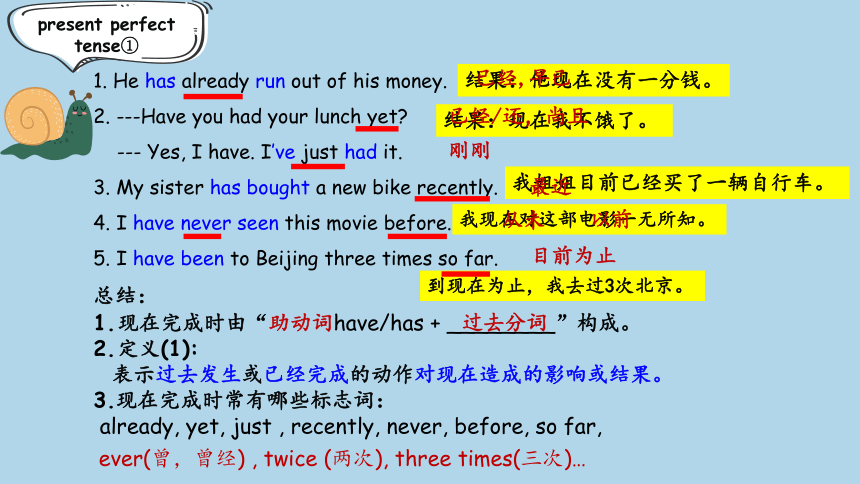
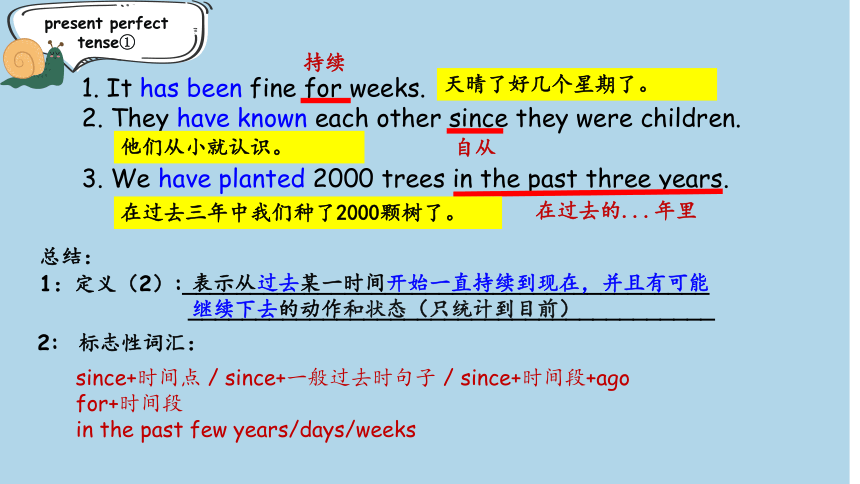
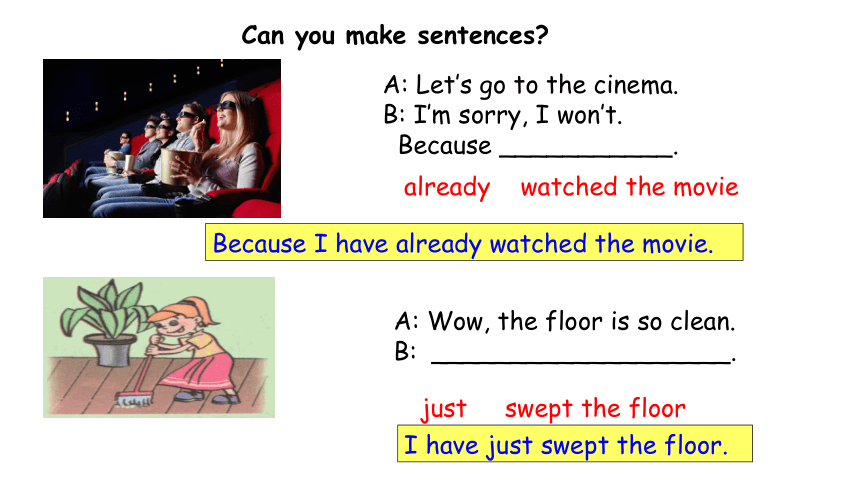
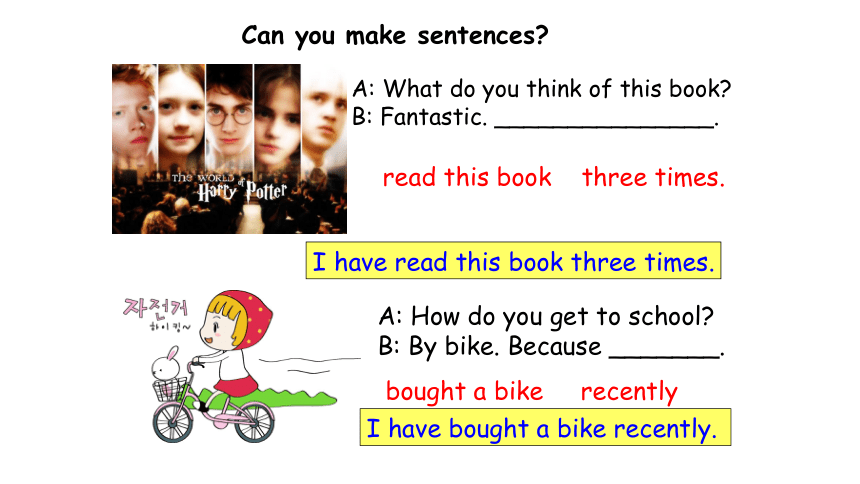
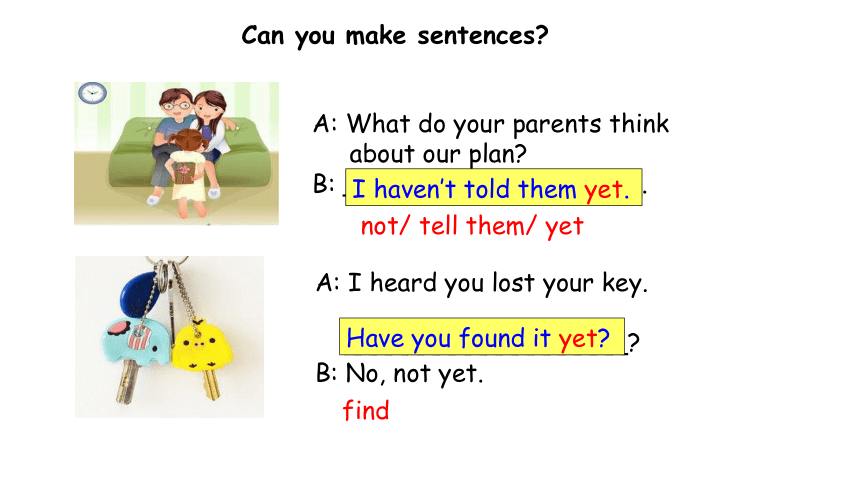
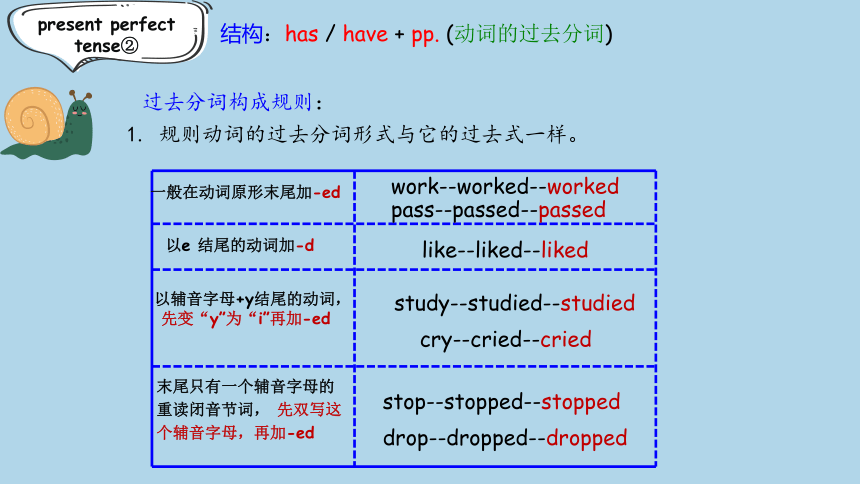
文档简介
(共19张PPT)
Unit 8
Have you read Treasure Island yet?
Grammar
present perfect tense
总结:
现在完成时由“助动词have/has + ________”构成。
定义(1):
表示过去发生或已经完成的动作对现在造成的影响或结果。
3.现在完成时常有哪些标志词:
already, yet, just , recently, never, before, so far,
1. He has already run out of his money.
2. ---Have you had your lunch yet
--- Yes, I have. I’ve just had it.
3. My sister has bought a new bike recently.
4. I have never seen this movie before.
5. I have been to Beijing three times so far.
过去分词
结果:现在我不饿了。
结果:他现在没有一分钱。
我姐姐目前已经买了一辆自行车。
我现在对这部电影一无所知。
到现在为止,我去过3次北京。
已经/还,尚且
刚刚
已经,早已
最近
以前
从未
目前为止
ever(曾,曾经) , twice (两次), three times(三次)…
present perfect tense①
1. It has been fine for weeks.
2. They have known each other since they were children.
3. We have planted 2000 trees in the past three years.
天晴了好几个星期了。
他们从小就认识。
在过去三年中我们种了2000颗树了。
总结:
1:定义(2):_______________________________________
_______________________________________
表示从过去某一时间开始一直持续到现在,并且有可能继续下去的动作和状态(只统计到目前)
持续
自从
在过去的...年里
present perfect tense①
2: 标志性词汇:
since+时间点 / since+一般过去时句子 / since+时间段+ago
for+时间段
in the past few years/days/weeks
A: Wow, the floor is so clean.
B: ___________________.
A: Let’s go to the cinema.
B: I’m sorry, I won’t.
Because ___________.
already watched the movie
just swept the floor
Because I have already watched the movie.
I have just swept the floor.
Can you make sentences
A: What do you think of this book
B: Fantastic. _______________.
A: How do you get to school
B: By bike. Because _______.
read this book three times.
bought a bike recently
I have read this book three times.
I have bought a bike recently.
Can you make sentences
Can you make sentences
A: What do your parents think
about our plan
B: ___________________.
not/ tell them/ yet
I haven’t told them yet.
A: I heard you lost your key.
__________________
B: No, not yet.
find
Have you found it yet
结构:has / have + pp. (动词的过去分词)
过去分词构成规则:
1. 规则动词的过去分词形式与它的过去式一样。
work--worked--worked
pass--passed--passed
like--liked--liked
study--studied--studied
cry--cried--cried
stop--stopped--stopped
drop--dropped--dropped
一般在动词原形末尾加-ed
以e 结尾的动词加-d
以辅音字母+y结尾的动词,
先变“y”为“i”再加-ed
末尾只有一个辅音字母的
重读闭音节词, 先双写这
个辅音字母,再加-ed
present perfect tense②
结构:has / have + pp. (动词的过去分词)
present perfect tense②
2. 不规则动词的过去分词形式请参看附表。P137-138
read
become
grow
begin
eat
choose
go
bring
teach
get
feel
drink
read
became
grew
began
ate
chose
went
brought
taught
got
felt
drank
read
become
grown
begun
eaten
chosen
gone
brought
taught
got
felt
drunk
present perfect tense③
句式结构变化:
我读过这本书。
I have read this book.
I haven’t read this book.
Have you read this book
Yes, I have. / No, I haven’t.
What have you read
总结
现在完成时的否定句是在________ 后加not,缩略为
haven’t或hasn’t。
2. 其一般疑问句时直接把__________提至句首。
肯定回答为:______________________;
否定回答为:______________________。
3. 特殊疑问句:
特殊疑问词+ _________ + 主语+_________+ 其他
have/has
have/has
Yes,主语+have/has
No,主语+haven’t/hasn’t
他吃过了晚饭。
He has had dinner.
He hasn’t had dinner.
Has he had dinner
Yes, he has. / No, he hasn’t.
What has he had for dinner
have/has 是助动词
have/has
过去分词
否定句
一般疑问句
答语
特殊疑问句
肯定句
1. Lin Feng has left school.(改为否定句)
Lin Feng ______________ school.
2. He has read this book before. (一般疑问句)
________________________________.
3. He planned to pick me up.
However, he _________ (not arrive) yet.
4. Have you brought your photos to school
_____________.
A. Yes, I do. B. Yes, I have.
C. No, I didn’t. D. No, I won’t.
5. He has read this book three times. (对画线提问)
What has he read three times
hasn’t arrived
Feedback
have/has 是助动词
hasn’t left
Has he read this book before
I have already finished my homework. (变否定句)
I haven’t finished my homework already.
×
易错点1:yet & already
yet 常用在_____________ 。在否定句,译为_____。
在疑问句,译为_______ 。
Not yet 还没
也,还
已经
否定句和疑问句的句尾
already 常用在_____中,译为________ 。
肯定句
已经
1. ____ your father come back from Shanghai
____. He is still there and having a meeting.
Have, Not already B.Have, Not yet
C. Has, Not already D. Has, Not yet
2.They have already left Guangzhou. (改一般疑问句)
_______they______ Guangzhou ______
3. Have you finished doing your homework _______
Yes, I have ________ finished it.
A. yet, yet B. yet, already
C. already, already D. already, yet
Have left yet
Feedback:
already & yet
现在完成时 VS 一般过去时
现在完成时 一般过去时
用法
时间状语
present perfect tense④
1)表示过去发生的动作对现在造成的影响,侧重于现在的情况;
表示过去某个时候发生的动作或存在的状态,只强调过去的动作,只表示动作发生在过去
already, yet, just, ever, never, before,
不和具体时间连用
yesterday, last week, just now, in 2012, two days ago等
具体的表示过去的时间状语连用
现在完成时 VS 一般过去时
现在完成时 一般过去时
用法
时间状语
present perfect tense④
1)表示过去发生的动作对现在造成的影响,侧重于现在的情况;2)表示过去的动作或状态持续到现在并有可能持续下去
表示过去某个时候发生的动作或存在的状态,只强调过去的动作,只表示动作发生在过去,不涉及现在。
already, yet, just, ever, never, before,
不和具体时间连用
yesterday, last week, just now, in 2012, two days ago等
具体的表示过去的时间状语连用
1. I ______ (join) the book club last month and I _______ (read) five books already.
2. I only ______ (start) taking French classes last week and I _________ (learn) 50 French words already.
3. Tony ________ (buy) a pop music CD yesterday but he ____________ (listen) to it yet.
4. They ___________ (listen) to many songs by The Beatles, but they cannot _____ (sing) any of them.
5. She ____ (see) the newspaper on the table this morning, but she _________ (have) anytime to read it yet.
joined
have read
started
have learned
have listened
sing
saw
hasn’t had
bought
hasn’t listened
Feedback:self-check 2
现在完成时 VS 一般过去时
I have just seen the movie.
I cleaned the classroom just now.
just “刚刚”,用于现在完成时 , 放在句中,肯定句
just now “刚才”用于一般过去时 , 放在句尾
I have (never) seen this movie before.
I bought a new bike two days ago.
before “以前”用于现在完成时, 句尾, 肯/否/疑句型均可
时间段+ ago “以前”,指一段时间之前,多用于一般过去时,句尾
-- Have you ever seen the movie
-- No, never.
ever 常用于疑问句
never 常用于否定句
just & just now
before & 时间段+ago
ever & never
易错点2
易错点3
易错点4
1. let’s go to play soccer. I have ____________ finished my homework.
2. Have you read this book ____________
3. I saw it three years _____.
4. Your father _________ (finish) his work just now.
5. Your father _________ just ___________ (finish) his
work.
6. “_________ he ___________ (finish) his homework ”
“Not yet.”
7. ____________ you ever ____________ (drink) coke
No, ________ .
yet, already, before, ago, just, just now, ever, never
already / just
yet / before
ago
finished
has finished
Has finished
Have drunk
never
Feedback:易错点
延续性动词和非延续性动词
现在完成时中表示短暂动作的动词不能与for, since 等引导的时间状语连用。若要与一段时间连用,则要将瞬间动词转化为意思相近的延续性动词。常见的变化:
buy-have open-be open close-be closed
come-be here borrow-keep begin/start-be on
go-be there finish-be over die-be dead
put on-wear wake up-awake catch a clod-have a cold
join-be in leave-be away fall asleep-be asleep
易错点5
Extension 拓展延伸
情境中的现在完成时
— Why didn’t you go to study with them
— Because I _____ my homework.
A. finished B. to finish
C. will finish D. have finished
2. Jack knows Alice. I ______ her to him.
A. have introduced B. will introduce
C. haven’t introduced D. have finished
Exercises (中考链接)
1 I scared of dogs ever since a dog hurt me when I was five years old.
A will be B was C have been D would be
2 --Yunnan is very beautiful. I there last year. Yes, I there twice.
A went; have gone B went; have been
C have gone; went D have been; went
3 -- You haven't been to the West Lake, have you
-- . But I will go there with my parents this summer vacation.
A No, I haven't B No, I didn't
C Yes, I have D Yes, I did
4--Have you read this book
--Yes, I it two months ago.
A is reading B have read C will read D read
5 --The boy misses his parents very much.
--So he does. They the hometown for nearly two years.
A have left B will leave C have been away from
C
B
A
D
C
定义(1)表示过去发生或已经完成的动作对现在造成的影响或结果。
(2)表示从过去某一时间开始一直持续到现在,并且有可能继续
下去的动作和状态(中统计到目前)
常见词语: recently, yet, already, just, never,
ever, before, so far, three times
易错点:yet & already
just & just now
before & ago
ever & never
过去分词的形式
句型转换
现在完成时VS一般过去时
现在完成时
Summary
Unit 8
Have you read Treasure Island yet?
Grammar
present perfect tense
总结:
现在完成时由“助动词have/has + ________”构成。
定义(1):
表示过去发生或已经完成的动作对现在造成的影响或结果。
3.现在完成时常有哪些标志词:
already, yet, just , recently, never, before, so far,
1. He has already run out of his money.
2. ---Have you had your lunch yet
--- Yes, I have. I’ve just had it.
3. My sister has bought a new bike recently.
4. I have never seen this movie before.
5. I have been to Beijing three times so far.
过去分词
结果:现在我不饿了。
结果:他现在没有一分钱。
我姐姐目前已经买了一辆自行车。
我现在对这部电影一无所知。
到现在为止,我去过3次北京。
已经/还,尚且
刚刚
已经,早已
最近
以前
从未
目前为止
ever(曾,曾经) , twice (两次), three times(三次)…
present perfect tense①
1. It has been fine for weeks.
2. They have known each other since they were children.
3. We have planted 2000 trees in the past three years.
天晴了好几个星期了。
他们从小就认识。
在过去三年中我们种了2000颗树了。
总结:
1:定义(2):_______________________________________
_______________________________________
表示从过去某一时间开始一直持续到现在,并且有可能继续下去的动作和状态(只统计到目前)
持续
自从
在过去的...年里
present perfect tense①
2: 标志性词汇:
since+时间点 / since+一般过去时句子 / since+时间段+ago
for+时间段
in the past few years/days/weeks
A: Wow, the floor is so clean.
B: ___________________.
A: Let’s go to the cinema.
B: I’m sorry, I won’t.
Because ___________.
already watched the movie
just swept the floor
Because I have already watched the movie.
I have just swept the floor.
Can you make sentences
A: What do you think of this book
B: Fantastic. _______________.
A: How do you get to school
B: By bike. Because _______.
read this book three times.
bought a bike recently
I have read this book three times.
I have bought a bike recently.
Can you make sentences
Can you make sentences
A: What do your parents think
about our plan
B: ___________________.
not/ tell them/ yet
I haven’t told them yet.
A: I heard you lost your key.
__________________
B: No, not yet.
find
Have you found it yet
结构:has / have + pp. (动词的过去分词)
过去分词构成规则:
1. 规则动词的过去分词形式与它的过去式一样。
work--worked--worked
pass--passed--passed
like--liked--liked
study--studied--studied
cry--cried--cried
stop--stopped--stopped
drop--dropped--dropped
一般在动词原形末尾加-ed
以e 结尾的动词加-d
以辅音字母+y结尾的动词,
先变“y”为“i”再加-ed
末尾只有一个辅音字母的
重读闭音节词, 先双写这
个辅音字母,再加-ed
present perfect tense②
结构:has / have + pp. (动词的过去分词)
present perfect tense②
2. 不规则动词的过去分词形式请参看附表。P137-138
read
become
grow
begin
eat
choose
go
bring
teach
get
feel
drink
read
became
grew
began
ate
chose
went
brought
taught
got
felt
drank
read
become
grown
begun
eaten
chosen
gone
brought
taught
got
felt
drunk
present perfect tense③
句式结构变化:
我读过这本书。
I have read this book.
I haven’t read this book.
Have you read this book
Yes, I have. / No, I haven’t.
What have you read
总结
现在完成时的否定句是在________ 后加not,缩略为
haven’t或hasn’t。
2. 其一般疑问句时直接把__________提至句首。
肯定回答为:______________________;
否定回答为:______________________。
3. 特殊疑问句:
特殊疑问词+ _________ + 主语+_________+ 其他
have/has
have/has
Yes,主语+have/has
No,主语+haven’t/hasn’t
他吃过了晚饭。
He has had dinner.
He hasn’t had dinner.
Has he had dinner
Yes, he has. / No, he hasn’t.
What has he had for dinner
have/has 是助动词
have/has
过去分词
否定句
一般疑问句
答语
特殊疑问句
肯定句
1. Lin Feng has left school.(改为否定句)
Lin Feng ______________ school.
2. He has read this book before. (一般疑问句)
________________________________.
3. He planned to pick me up.
However, he _________ (not arrive) yet.
4. Have you brought your photos to school
_____________.
A. Yes, I do. B. Yes, I have.
C. No, I didn’t. D. No, I won’t.
5. He has read this book three times. (对画线提问)
What has he read three times
hasn’t arrived
Feedback
have/has 是助动词
hasn’t left
Has he read this book before
I have already finished my homework. (变否定句)
I haven’t finished my homework already.
×
易错点1:yet & already
yet 常用在_____________ 。在否定句,译为_____。
在疑问句,译为_______ 。
Not yet 还没
也,还
已经
否定句和疑问句的句尾
already 常用在_____中,译为________ 。
肯定句
已经
1. ____ your father come back from Shanghai
____. He is still there and having a meeting.
Have, Not already B.Have, Not yet
C. Has, Not already D. Has, Not yet
2.They have already left Guangzhou. (改一般疑问句)
_______they______ Guangzhou ______
3. Have you finished doing your homework _______
Yes, I have ________ finished it.
A. yet, yet B. yet, already
C. already, already D. already, yet
Have left yet
Feedback:
already & yet
现在完成时 VS 一般过去时
现在完成时 一般过去时
用法
时间状语
present perfect tense④
1)表示过去发生的动作对现在造成的影响,侧重于现在的情况;
表示过去某个时候发生的动作或存在的状态,只强调过去的动作,只表示动作发生在过去
already, yet, just, ever, never, before,
不和具体时间连用
yesterday, last week, just now, in 2012, two days ago等
具体的表示过去的时间状语连用
现在完成时 VS 一般过去时
现在完成时 一般过去时
用法
时间状语
present perfect tense④
1)表示过去发生的动作对现在造成的影响,侧重于现在的情况;2)表示过去的动作或状态持续到现在并有可能持续下去
表示过去某个时候发生的动作或存在的状态,只强调过去的动作,只表示动作发生在过去,不涉及现在。
already, yet, just, ever, never, before,
不和具体时间连用
yesterday, last week, just now, in 2012, two days ago等
具体的表示过去的时间状语连用
1. I ______ (join) the book club last month and I _______ (read) five books already.
2. I only ______ (start) taking French classes last week and I _________ (learn) 50 French words already.
3. Tony ________ (buy) a pop music CD yesterday but he ____________ (listen) to it yet.
4. They ___________ (listen) to many songs by The Beatles, but they cannot _____ (sing) any of them.
5. She ____ (see) the newspaper on the table this morning, but she _________ (have) anytime to read it yet.
joined
have read
started
have learned
have listened
sing
saw
hasn’t had
bought
hasn’t listened
Feedback:self-check 2
现在完成时 VS 一般过去时
I have just seen the movie.
I cleaned the classroom just now.
just “刚刚”,用于现在完成时 , 放在句中,肯定句
just now “刚才”用于一般过去时 , 放在句尾
I have (never) seen this movie before.
I bought a new bike two days ago.
before “以前”用于现在完成时, 句尾, 肯/否/疑句型均可
时间段+ ago “以前”,指一段时间之前,多用于一般过去时,句尾
-- Have you ever seen the movie
-- No, never.
ever 常用于疑问句
never 常用于否定句
just & just now
before & 时间段+ago
ever & never
易错点2
易错点3
易错点4
1. let’s go to play soccer. I have ____________ finished my homework.
2. Have you read this book ____________
3. I saw it three years _____.
4. Your father _________ (finish) his work just now.
5. Your father _________ just ___________ (finish) his
work.
6. “_________ he ___________ (finish) his homework ”
“Not yet.”
7. ____________ you ever ____________ (drink) coke
No, ________ .
yet, already, before, ago, just, just now, ever, never
already / just
yet / before
ago
finished
has finished
Has finished
Have drunk
never
Feedback:易错点
延续性动词和非延续性动词
现在完成时中表示短暂动作的动词不能与for, since 等引导的时间状语连用。若要与一段时间连用,则要将瞬间动词转化为意思相近的延续性动词。常见的变化:
buy-have open-be open close-be closed
come-be here borrow-keep begin/start-be on
go-be there finish-be over die-be dead
put on-wear wake up-awake catch a clod-have a cold
join-be in leave-be away fall asleep-be asleep
易错点5
Extension 拓展延伸
情境中的现在完成时
— Why didn’t you go to study with them
— Because I _____ my homework.
A. finished B. to finish
C. will finish D. have finished
2. Jack knows Alice. I ______ her to him.
A. have introduced B. will introduce
C. haven’t introduced D. have finished
Exercises (中考链接)
1 I scared of dogs ever since a dog hurt me when I was five years old.
A will be B was C have been D would be
2 --Yunnan is very beautiful. I there last year. Yes, I there twice.
A went; have gone B went; have been
C have gone; went D have been; went
3 -- You haven't been to the West Lake, have you
-- . But I will go there with my parents this summer vacation.
A No, I haven't B No, I didn't
C Yes, I have D Yes, I did
4--Have you read this book
--Yes, I it two months ago.
A is reading B have read C will read D read
5 --The boy misses his parents very much.
--So he does. They the hometown for nearly two years.
A have left B will leave C have been away from
C
B
A
D
C
定义(1)表示过去发生或已经完成的动作对现在造成的影响或结果。
(2)表示从过去某一时间开始一直持续到现在,并且有可能继续
下去的动作和状态(中统计到目前)
常见词语: recently, yet, already, just, never,
ever, before, so far, three times
易错点:yet & already
just & just now
before & ago
ever & never
过去分词的形式
句型转换
现在完成时VS一般过去时
现在完成时
Summary
同课章节目录
- Unit 1 What's the matter?
- Section A
- Section B
- Unit 2 I'll help to clean up the city parks.
- Section A
- Section B
- Unit 3 Could you please clean your room?
- Section A
- Section B
- Unit 4 Why don't you talk to your parents?
- Section A
- Section B
- Unit 5 What were you doing when the rainstorm came
- Section A
- Section B
- Review of Units 1-5
- Unit 6 An old man tried to move the mountains.
- Section A
- Section B
- Unit 7 What's the highest mountain in the world?
- Section A
- Section B
- Unit 8 Have you read Treasure Island yet?
- Section A
- Section B
- Unit 9 Have you ever been to a museum?
- Section A
- Section B
- Unit 10 I've had this bike for three years.
- Section A
- Section B
